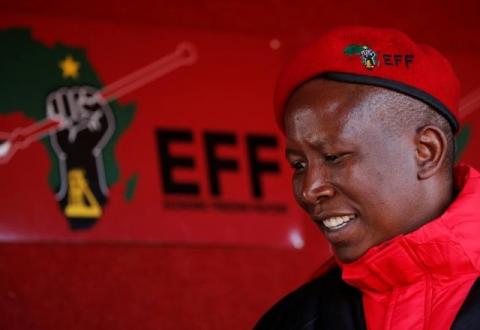Advertisement
Key South African economic hubs set for minority rule
JOHANNESBURG (Reuters) - South Africa's biggest parties have failed to form coalition governments in major economic hubs following elections this month, they said on Wednesday, raising the prospect of less stable minority administrations.
Since the African National Congress (ANC) lost its majority in major municipalities this month, in its worst electoral performance since it came to power nationally at the end of apartheid, the main parties have been attempting to assemble coalitions.
The radical leftist Economic Freedom Fighters (EFF), the ANC and the main national opposition, the Democratic Alliance (DA), failed to agree on major policies, EFF leader Julius Malema told reporters.
Malema, a fiery former ANC youth leader, said the EFF would vote with the DA at council meetings in order to deprive President Jacob Zuma's ANC of municipalities that it has controlled since the end of white-minority rule 22 years ago.
With EFF votes, the DA is now likely to form minority administrations in Johannesburg; the neighbouring industrial region of Ekurhuleni that hosts the main airport; and Tshwane, which includes the capital Pretoria, Malema said.
He also said the EFF would assist the DA in the symbolically important Nelson Mandela Bay, which includes the manufacturing hub Port Elizabeth, although the DA said it could rule there without EFF help.
Malema sought to stress that the EFF did not support the policies of the DA, which he described as a party of "white racists".
"We are caught between two devils. The DA is a better devil than the ANC. We are not in bed with them," he told reporters in the Alexandra township in Johannesburg.
"The ANC will not get a single vote from the EFF. We will vote for the opposition because the ANC must be removed from power."
Malema said his party would work with the ANC only if it removed Zuma, made education free for all, and nationalised banks and mines, among other things -- policies that it is highly unlikely to agree to.
MINORITY GOVERNMENTS
The DA's lead negotiator, James Selfe, said his party was confident the EFF would give it the support it needed to form minority governments.
He also said the DA would be able to form a coalition government in Nelson Mandela Bay and several other municipalities without the support of the EFF.
The EFF and DA both said after the Aug. 3 vote that they would not work with the ANC because their supporters had voted for change - but they are far apart in terms of policy, approach and experience.
The DA is pro-business and has a largely white support base, while the EFF wants to redistribute land from whites to blacks without compensation and has been a disruptive political influence since it was formed three years ago.
Aubrey Matshiqi, a political analyst at the Helen Suzman Foundation, said it was not out of the question that political instability could trigger re-runs of some municipal elections in two years' time.
The DA won 43 percent of the vote in Tshwane while the ANC got 41 percent and the EFF 12 percent. In Johannesburg, the ANC won 45 percent, the DA 38 percent and the EFF 11 percent.
The rand was marginally higher after weakening late on Tuesday.
(Editing by Kevin Liffey)



















Add new comment